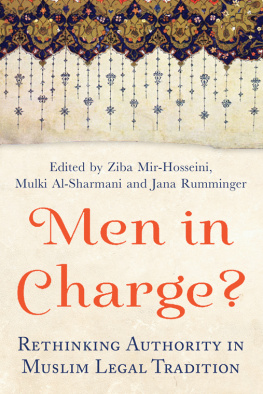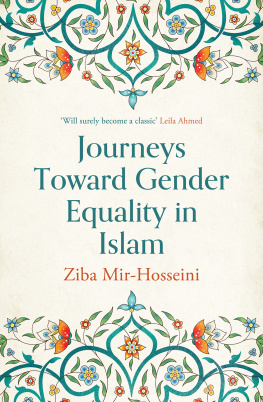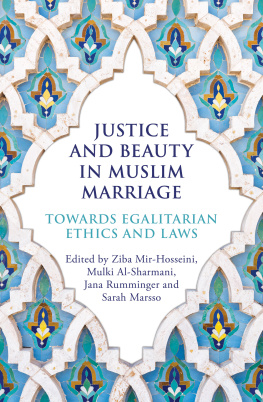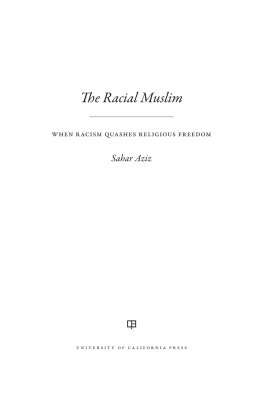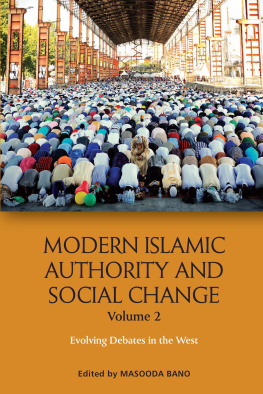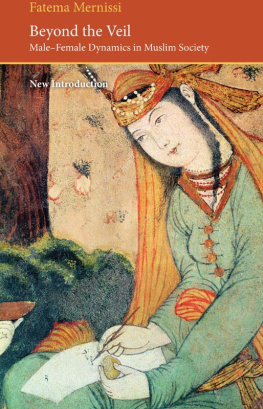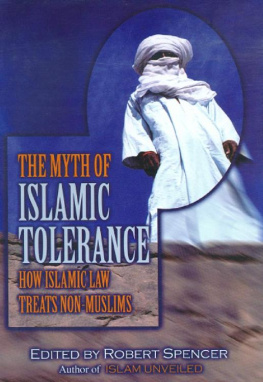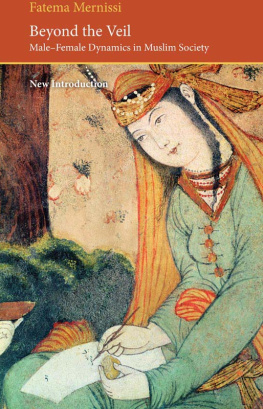


A Oneworld Book
First published by Oneworld Publications, 2015
This ebook edition published by Oneworld Publications, 2015
Copyright Ziba Mir-Hosseini, Mulki Al-Sharmani and Jana Rumminger 2015
All rights reserved
Copyright under Berne Convention
A CIP record for this title is available
from the British Library
ISBN 978-1-78074-716-3
ISBN 978-1-78074-717-0 (eBook)
Typeset by Siliconchips Services Ltd, UK
Oneworld Publications
10 Bloomsbury Street
London WC1B 3SR
England
Stay up to date with the latest books, special offers, and exclusive content from Oneworld with our monthly newsletter
Sign up on our website
www.oneworld-publications.com
Contents
Zainah Anwar
Ziba Mir-Hosseini, Mulki Al-Sharmani and Jana Rumminger
Ziba Mir-Hosseini
Omaima Abou-Bakr
Asma Lamrabet
Ayesha S. Chaudhry
Sadiyya Shaikh
Lynn Welchman
Marwa Sharafeldin
Lena Larsen
Mulki Al-Sharmani and Jana Rumminger
Amina Wadud
T his book grew out of a project initiated by Musawah, the global movement for equality and justice in Muslim families. Musawah, which means Equality in Arabic, is led by Muslim women who seek to publicly reclaim and redefine Islams spirit of justice for all. Initiated in 2007 by Sisters in Islam, the Malaysian womens rights group, Musawah was launched in February 2009 in Kuala Lumpur at a gathering that brought together over 250 women and men, activists, scholars and policymakers from 47 countries, including 32 countries that are members of the Organisation of Islamic Cooperation.
Musawah links scholarship with activism to bring new perspectives on Islamic teachings, with the objective of inserting womens voices and concerns into the production of religious knowledge and legal reform in Muslim contexts. As a knowledge-building movement, Musawahs first project was to rethink the two concepts qiwamah and wilayah, which are commonly understood in Muslim legal tradition as mandating mens authority over women. These legal concepts shape the ways in which the Muslim family is understood and gender relations are structured, and continue to underpin the discriminatory legal framework that governs family life and womens rights in Muslim law and practice.
The decision to prioritize the issue of qiwamah and wilayah as Musawahs first feminist knowledge-building project was driven by the urgent need to rethink these discriminatory legal postulates in light of the changing realities of womens lives today. This five-year Knowledge Building Initiative on Qiwamah and Wilayah brought together scholars trained in different academic fields with Musawah activists and researchers to engage with Muslim legal tradition in a serious, rigorous and critical fashion. These participants offered a range of knowledge and skills related to Muslim legal tradition, feminist methodologies, womens lived realities, and diverse legal systems, which led to rich discussions that explored the possibility and necessity of reform.
The primary objective of the project was to produce new feminist knowledge through rethinking the ideals and realities of the two key legal concepts qiwamah and wilayah in the context of twenty-first-century understandings of equality and justice. The initiative consisted of three main elements. The first entailed collaboration with scholars to conduct theological, sociological and legal studies of the two concepts within Muslim legal tradition. The second was a participatory Global Life Stories Project with teams of academics and activists in ten countries (Bangladesh, Canada, Egypt, Gambia, Indonesia, Iran, Malaysia, Nigeria, Philippines and the United Kingdom) which undertook documentation and analysis of womens life stories in order to shed light on how qiwamah - and wilayah -based norms and practices have shaped their experiences. The final element involved opening spaces such as in-person and electronic discussions and communications where scholars and activists from different regions could work together to develop new understandings of the two concepts.
This team of scholars and activists met several times to build evidence-based knowledge and progress towards meaningful change in Muslim gender norms. Five main workshops and seminars were held in various places as part of the project: Cairo, Egypt (January 2010); Jakarta, Indonesia (July 2011); Amman, Jordan (November 2011); Bali, Indonesia (April 2012); and Kuala Lumpur, Malaysia (December 2012). These meetings were organized to exchange knowledge, provide critical feedback to the draft scholarly papers, develop the methodology used in the life stories documentation process, and build new understandings and analysis of the life stories. Local scholars and womens rights groups joined the Musawah team in discussions and reflective debates in the cities where the meetings were held.
As founding director of Musawah, I am proud that this initiative, in key aspects of its design and research processes, reflects the Musawah belief that the production and sharing of knowledge must be participatory and interdisciplinary, recognize non-traditional forms of expertise and begin from contexts rather than texts. We believe that in this way the knowledge produced will be grounded in the lived realities of women and men, such realities then informing the approach to the text and the questions to be asked.
Since its launch in 2009, Musawah has gained an international reputation for its groundbreaking holistic approach to knowledge production, public education and law reform to advance the rights of women living in Muslim contexts. It is contributing critically to the new feminist voices in Islam that appeal to the higher objectives of the faith in order to challenge patriarchal interpretations of the Shariah from within Islamic tradition. Using a holistic framework that integrates Islamic teachings, universal human rights standards, contemporary state constitutions and laws and the lived realities of women and men, it seeks to apply feminist and rights-based approaches to the understanding of equality and justice in Muslim legal tradition. Such approaches help reveal the tension between the egalitarian and hierarchical voices in the tradition and uncover womens voices that have been silenced in the production of religious knowledge so that their concerns can be heard and their interests can be promoted.
We in Musawah would like to record our deepest gratitude to the three coeditors of this book, who were closely involved in all aspects of our Knowledge Building Initiative on Qiwamah and Wilayah. Ziba Mir-Hosseini, as the convener of the Knowledge Building Working Group, tirelessly and passionately led the conceptualization of the initiative, worked closely with the contributors to this book and nursed it through every stage in order to maintain clarity of mission and concept. Mulki Al-Sharmani and Jana Rumminger, as members of the Knowledge Building Working Group, took responsibility for organizing and implementing the various activities undertaken in this initiative, particularly the process of producing and editing this book. In addition, Mulki Al-Sharmani, as the coordinator of the Global Life Stories Project, led the process of implementing the project in the ten participating countries, guiding and nurturing the teams of researchers based in these countries as they gathered data on womens realities and analysed their findings. Jana Rumminger, as the coordinator of the initiative, held various parts of the work together with her usual meticulousness and dedication, ensuring consistency and precision. In the Musawah Secretariat in Kuala Lumpur, we call them our dream team.
Next page
